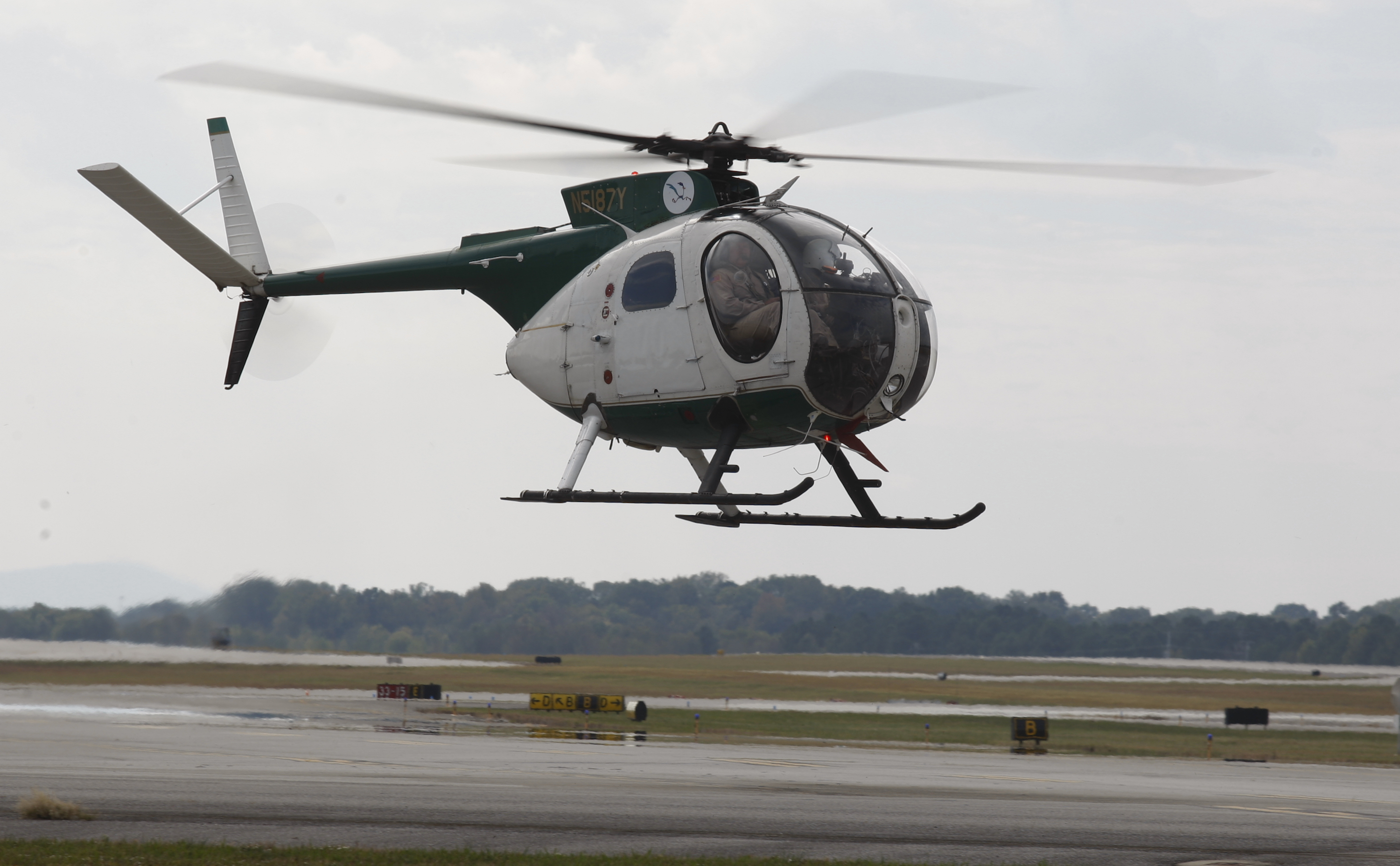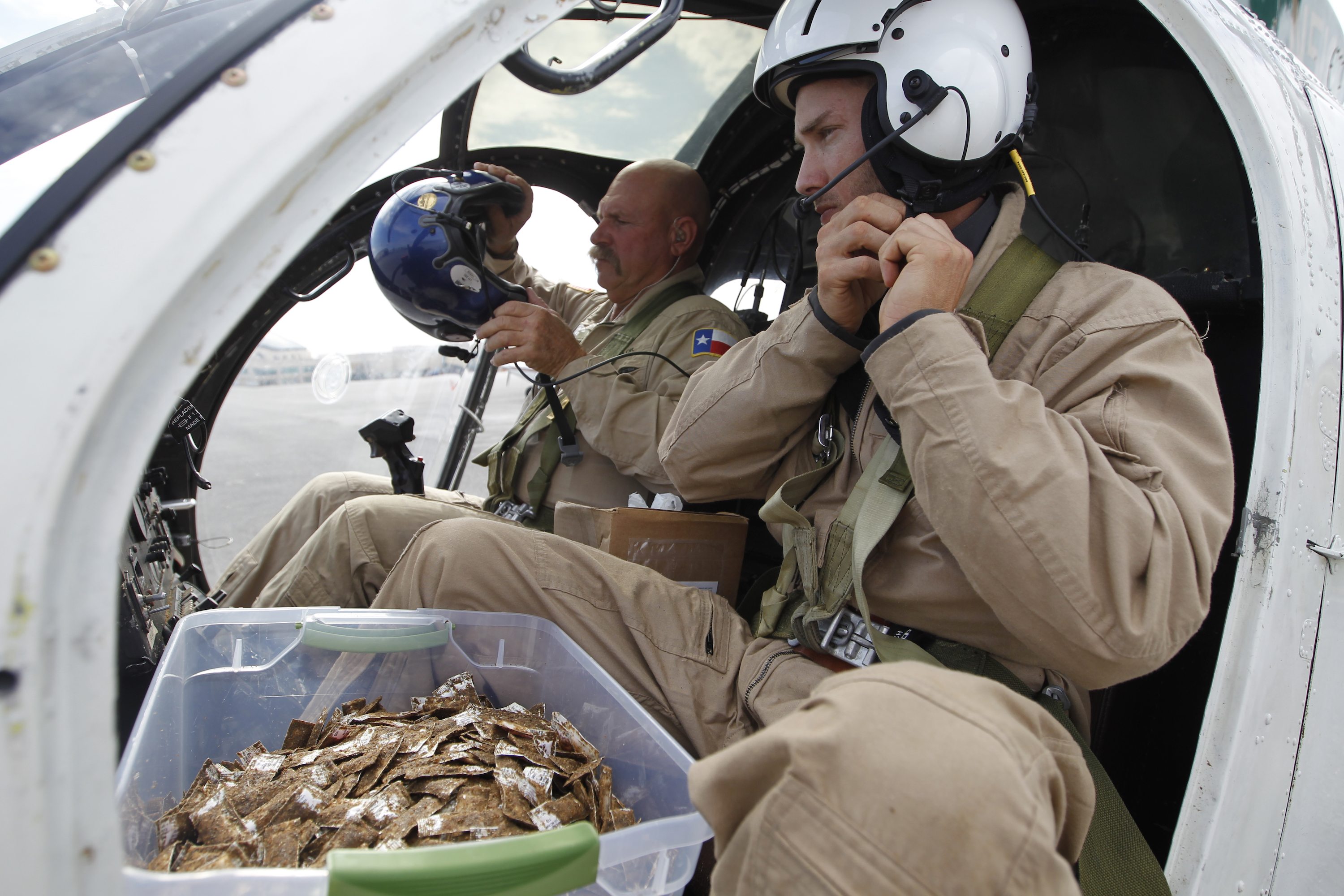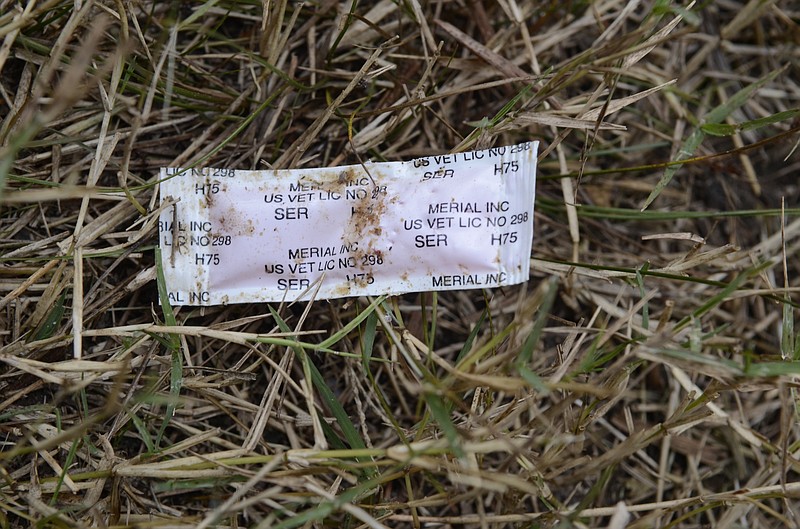 A USDA helicopter takes off Tuesday, Oct. 22, 2013, from Chattanooga Metropolitan Airport's Lovell Field in Chattanooga, Tenn., to distribute baited packets of rabies vaccine. The USDA is spending several days dropping bait-coated packets of rabies vaccine from a helicopter across Hamilton and Bradley Counties to combat rabies in raccoons.
A USDA helicopter takes off Tuesday, Oct. 22, 2013, from Chattanooga Metropolitan Airport's Lovell Field in Chattanooga, Tenn., to distribute baited packets of rabies vaccine. The USDA is spending several days dropping bait-coated packets of rabies vaccine from a helicopter across Hamilton and Bradley Counties to combat rabies in raccoons.RABIES FACTS
Any mammal can get rabies. The most common wild reservoirs of rabies are raccoons, skunks, bats, foxes and coyotes. Domestic mammals like cats, cattle and dogs are the most frequently reported household animals to get rabies.The rabies virus is transmitted through saliva or brain or nervous system tissue. Rabies can be contracted only by coming in contact with these specific bodily excretions and tissues.If exposed, wash wounds immediately with soap and water. If attacked by an animal see a doctor, who will decide if a rabies vaccination is needed.Source: U.S. Centers for Disease Control and PreventionREPORT SUSPICIOUS ANIMALSAnyone who sees a wild animal acting strangely or overly friendly should contact the local county health department or the U.S. Department of Agriculture Wildlife Services at 1-866-487-3297.
Aiming primarily at those rascally raccoons and stinky skunks, the U.S. Fish and Wildlife Service and state officials in Tennessee, Georgia and Alabama will be in the air and on the ground in coming weeks distributing rabies vaccine baits.
The U.S. Department of Agriculture's oral rabies vaccine bait drops take place up and down the eastern seaboard each year, beginning in the Northeast to Mid-Atlantic states in August and across the Southeast from late September to mid-October.
 USDA wildlife specialist Will Guigou, right, and pilot Thomas Taylor prepare to distribute packets of baited rabies vaccine by helicopter from a container between Guigou's knees Tuesday, Oct. 22, 2013, at Chattanooga Metropolitan Airport's Lovell Field in Chattanooga, Tenn. The USDA is spending several days dropping bait-coated packets of rabies vaccine from a helicopter across Hamilton and Bradley Counties to combat rabies in raccoons.
USDA wildlife specialist Will Guigou, right, and pilot Thomas Taylor prepare to distribute packets of baited rabies vaccine by helicopter from a container between Guigou's knees Tuesday, Oct. 22, 2013, at Chattanooga Metropolitan Airport's Lovell Field in Chattanooga, Tenn. The USDA is spending several days dropping bait-coated packets of rabies vaccine from a helicopter across Hamilton and Bradley Counties to combat rabies in raccoons.In the South, the baits - about 2 million individual fish-meal-slathered packets - are intended to vaccinate wildlife along the edge of the rabies virus' spread west from the Appalachians, officials said. While the baits target the spreading of the virus, rabies already is a long-standing problem to the east.
In the Chattanooga region, raccoons, foxes, bats and skunks are the most frequent wild carriers, and Georgia typically has far more instances of the potentially deadly virus than Tennessee or Alabama. Not only does the virus threaten household pets and humans, there have been instances of the disease in horses and other domestic animals.
Pet vaccinations and the baits, which pose no danger to pets but can upset their stomachs, are the best defense against human exposure, Georgia officials said.
"We try to make the public aware that [bait drops] are happening and that they really need to get their pets vaccinated and that they need to avoid any animal, if they don't know its vaccination history," Northwest Georgia Health District spokeswoman Jennifer King said Tuesday.
"A lot of people will see a stray cat or dog and not stop to think that it's not just skunks and foxes and raccoons that can carry rabies," King said. "It can also be that sweet, innocent-looking little kitten that looks too adorable to be carrying anything. It could be carrying rabies, too."
Pet vaccinations not only protect the pet, they create a buffer between any wild animals that a domestic animal might encounter and their human caretakers, she said.
Georgia had quite a few active positive rabies cases in the fall of 2016 through early 2017, Whitfield County environmental health manager Chad Mulkey said. There were also suspected human exposures in 2017.
Bait drops in North Georgia will start Oct. 6 from Dalton, Georgia, in Whitfield County, to include parts of Murray County and extend west to the Alabama line.
In July 2017, 12 North Georgia residents were treated for exposure to rabies because they had contact with two puppies - one in Gilmer County and an unrelated one in Cherokee County - that had been exposed to rabid wild animals.
The incidents led to a call from Georgia health officials to be on the lookout for strange-acting wild animals and to report them to officials.
Rabies is deadly, and once a victim of the disease starts showing symptoms there's not much hope.
"I think there's only been two cases in humans where they tested positive and survived," Mulkey said.
"If you get it, your chances are not great. That's why we're so adamant about getting pets vaccinated and livestock vaccinated."
Rabies, a disease that effects the central nervous system of mammals and kills more than 59,000 people a year worldwide, is not as commonly found in Tennessee and Alabama but it is present and spreading west, according to state and federal health officials and the U.S. Centers for Disease Control and Prevention.
"Control of raccoon rabies is vital to public health for people," Tennessee Department of Health Commissioner Dr. John Dreyzehner said. Dreyzehner said the state's people, pets, livestock and wildlife benefit from vaccinations that help prevent the spread of the virus.
Bait drops in Tennessee are scheduled for Oct. 2-20 in Bradley, Hamilton, Marion, McMinn, Meigs, Monroe, Polk and Sequatchie counties. Bait drops will take place in Northeast Tennessee's counties during the period, as well.
In Alabama, bait drops from fixed-wing aircraft are planned from the Alabama-Georgia state line in Jackson and DeKalb counties southwest toward Birmingham, according to USDA rabies vaccination drop maps.
According to the Alabama Department of Health, there were no confirmed rabies cases in 2017 or 2018 in Jackson or DeKalb counties, but there were confirmed cases in both years in neighboring Marshall, Etowah and Cherokee counties and other Alabama counties to the south.
Contact staff writer Ben Benton at bbenton@timesfreepress.com or 423-757-6569. Follow him on Twitter @BenBenton or at www.facebook.com/benbenton1.
